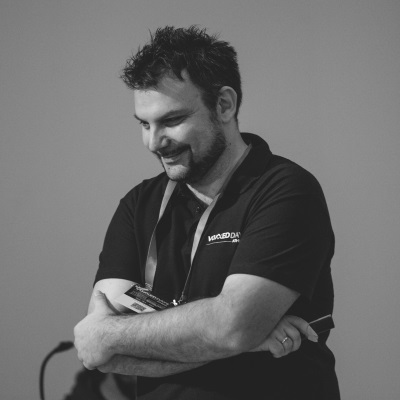Architecture Track
* more speakers to be announced shortly
Speaker: David Schmitz
Talk: 10 Tips for failing badly at Microservices
Microservices are just a bunch hip new framework plus some AngularJS frontend or React, right? So, if you want to make sure that you absolutely and definitely fail at your Microservice project, then watch this talk and learn how.
Using real world experience from multiple green field and brown field projects, I can show you: - how to ignore the mandatory organizational impact - how to focus on the code only without any regard towards ops and testing - continuous deployment is for losers. Real projects use their meat cloud for delivery - jumping onto every new and untested framework is a must - EventSourcing and CQRS are both free lunches. So, you can add complexity without any real need - ...and more
If you mind my tips, then surely you will fail at Microservices and your boss will never again try to move away from your beloved vintage monolith.

Speaker: Yegor Bugayenko
Talk: How to cut corners and stay cool
You have a task assigned to you, and you don't like it. You are simply not in the mood. You don't know how to fix that damn bug. You have no idea how that bloody module was designed, and you don't know how it works. But you have to fix the issue, which was reported by someone who has no clue how this software works. You get frustrated and blame that stupid project manager and programmers who were fired two years ago. You spend hours just to find out how the code works. Then even more hours trying to fix it. In the end, you miss the deadline and everybody blames you.
Been there, done that?

Speaker: Nicolas Frankel
Talk: Improve your tests quality with Mutation Testing
Unit testing ensures your production code is relevant. But what does ensure your testing code is relevant?
Come discover mutation testing and make sure your never forget another assert again.
In the realm of testing, the code coverage metrics is the most often talked about. However, it doesn't mean that the test has been useful or even that an assert has been coded. Mutation testing is a strategy to make sure that the test code is relevant.
In this talk, I will explain how Code Coverage is computed and what its inherent flaw is. Afterwards, I will describe how Mutation Testing work and how it helps pointing out code that is tested but leave out corner cases. I will also demo PIT, a Java production-grade framework that enables Mutation Testing on a simple code base. If time allows, a demo will also show how PIT can be integrated with Sonar.

Speaker: Patroklos Papapetrou
Talk: Beyond Clean Code and Code Quality
Today clean and code quality practices are what unit testing and continuous integration were 10 years ago.
We all know about them, we all agree with them, we all try to apply them. Some of us succeed some of us fail.
In this session, I will discuss my personal experience about code quality and clean and how we can take it to the next level using lean tools and practices.
